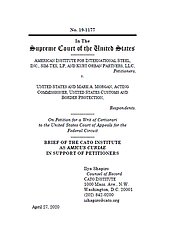Learn more about Cato’s Amicus Briefs Program.
Courts routinely review agency action for reasonableness. But when Congress delegates the same type of regulatory authority to the president, lower courts generally refrain from reasonableness review, out of a mistaken understanding of the Supreme Court’s precedent. As a practical result, the president is permitted to do virtually anything when exercising statutory powers.
This perverse incentive animates President Trump’s 2018 “national security” tariffs on steel imports. There is no reasonable basis for these regulations. Military requirements for steel represent only three percent of the commodity’s domestic production. Indeed, the United States produces twice as much steel as it imports. More troubling is that the president made no effort to explain why he departed from his predecessors’ practice, which uniformly had accounted for the allied status of countries potentially subject to Section 232.
Faced with these unprecedented and unreasonable regulations, the American Institute for International Steel (a trade group of steel‐consuming companies) and other parties harmed by the tariffs filed suit in the Court of International Trade (“CIT”). They alleged that Section 232 is an unconstitutional delegation of lawmaking power.
Under black letter law, any court would have set aside these measures as arbitrary and capricious—if they had been issued by an agency. But because Congress delegated this regulatory power to the president, the CIT and Federal Circuit felt powerless to act.
These courts got it wrong. Congress did not intend for the president to simply cite “national security” as a pretense for unfettered regulatory power. There must be some limits on the president’s Section 232 authority.
By abandoning judicial review of the president’s statutory powers, the CIT and Federal Circuit ducked their duty “to say what the law is.” Those cases, moreover, are part of a wider circuit split on this important constitutional question. There is, accordingly, an urgent need for the Court to provide guidance by affirming that Section 232 is a permissible legislative delegation only if complemented by calibrated judicial review.
Cato has filed multiple briefs in this case. Last month, the plaintiffs/appellants sought Supreme Court review of the Federal Circuit’s disposition. Today, Cato filed a brief in support of their petition. We argue that this controversy is an ideal vehicle for the Court to clarify that its precedents do not preclude reasonableness review of the president’s statutory powers.

This work is licensed under a Creative Commons Attribution-NonCommercial-ShareAlike 4.0 International License.


